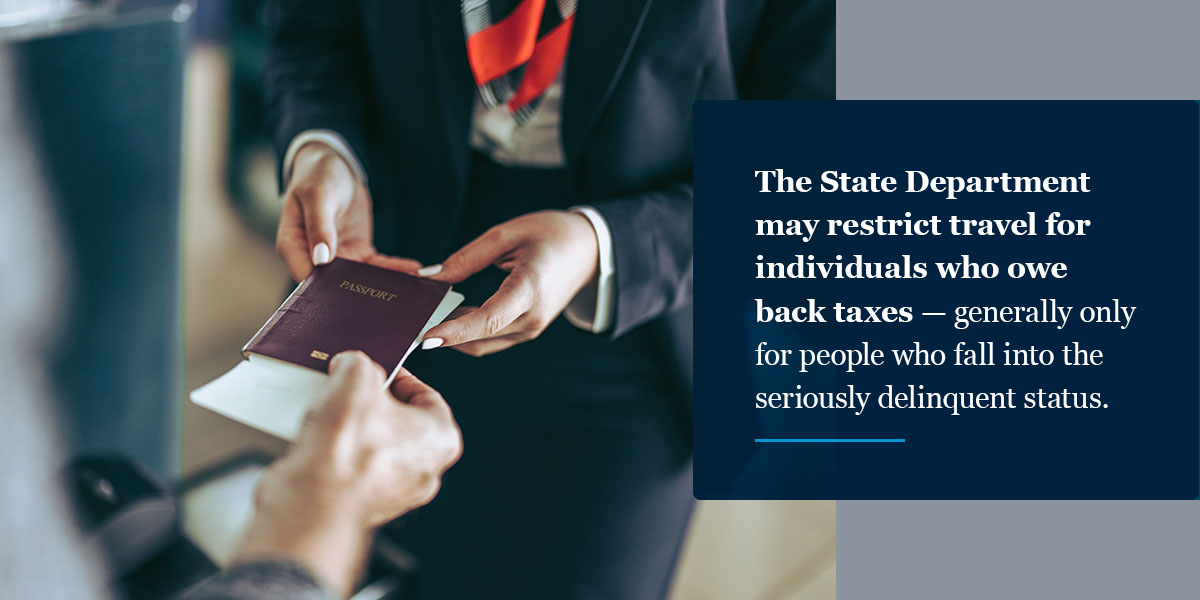 If you have a tax balance with the IRS, you may be wondering if you can get a passport. While having your passport renewal denied or revoked is a possibility, it depends on the amount you owe the IRS.
If you have a tax balance with the IRS, you may be wondering if you can get a passport. While having your passport renewal denied or revoked is a possibility, it depends on the amount you owe the IRS.
If your taxes become seriously delinquent, the IRS can take action against you, leading to the State Department denying or revoking your passport. While your account may not be seriously late, outstanding taxes, interest and penalties can quickly add up.
Learn more about what leads to passport denial or a denied passport and what steps you can take to resolve it.
If you owe taxes to the IRS, they will send you several notices in the mail. However, there are some cases when you might not find out that your tax balance is seriously delinquent until you try to apply for a passport and get denied.
Seriously delinquent unpaid taxes are when you have over $59,000 of unpaid federal taxes, penalties and interest. These taxes can include individual taxes, business taxes that an individual is personally liable for, trust fund recovery penalties and other civil penalties. Before taxes owed are declared seriously delinquent, the IRS must have filed a notice of federal tax lien and have exhausted all other measures under the law to recover the amount owed or issued a levy to collect.
If the above requirements have been met, the IRS will send a Notice CP508C by mail to your last known address and will certify you as seriously delinquent to the State Department for them to take action. After receiving the certificate, the State Department will deny an individual passport application or revoke a current passport. If you are overseas at the time of the certificate being issued, the State Department may issue a limited-validity passport that will allow you to return home to the United States.
Some taxes are excluded from serious delinquency, including:
The IRS will not declare you as seriously delinquent if the following applies to you:
The IRS may also cancel taxes owed for individuals serving in a combat zone or participating in a contingency area.
If you are applying for or renewing your passport but have delinquent taxes owed, the State Department will issue you a letter and keep your application open for 90 days to give you enough time to complete one of these steps:
If you fail to do any of the above within 90 days, the State Department will close your application and you will have to apply again.
Besides delinquency, there are a few reasons why the State Department may stop you from getting a passport:
In addition, you may be denied if you have a history of obtaining a passport fraudulently, or if you have a court order that bars you from leaving the country.
How can you renew or apply for a passport if you owe taxes? While it largely depends on your circumstances, it is possible to get your passport.
If the State Department denies your passport application, the best course of action is to figure out how you will pay your tax balance to the IRS. Options may include a payment plan, OIC or paying a lump sum.
If you have a payment plan set up and agree to pay back the total balance, the IRS will reverse the certification. This will typically happen within 30 days of payment. There are cases when the IRS can expedite the reversal process if the application is urgent.
Once the IRS reverses the decision, you can apply for a new passport. If you submitted your application and are still within the 90-day window, the State Department will resume your application process where you left off. If you haven’t yet applied for your passport, you can follow the process to apply for a new one detailed by the State Department.
Even if you owe some taxes, as long as they are not seriously delinquent, you can still get a passport.
If you owe taxes, you can take the following steps to renew your passport:
 The State Department may restrict travel for individuals who owe back taxes — generally only for people who fall into the seriously delinquent status. You can still travel outside the country if you don’t have debt delinquency.
The State Department may restrict travel for individuals who owe back taxes — generally only for people who fall into the seriously delinquent status. You can still travel outside the country if you don’t have debt delinquency.
Depending on how much you owe, it may be a matter of time before your taxes become seriously delinquent. If this happens while you are outside the country, you may have trouble traveling back. This is why it’s important to make arrangements to resolve the taxes you owe to avoid interference with your travel plans.
If you have imminent travel plans within the next 45 days, you must contact the IRS as soon as possible to have the certification reversed. For the IRS to expedite the renewal, you’ll need to have an open application or renewal request. When expedited, the IRS can shorten the decertification process from 30 days to 14-21 days. To start this process, you’ll need to inform the IRS that you plan to travel within the next 45 days or you live overseas.
Submit the following documents with your request:
When the IRS reverses the certification, they will send you a Notice CP508R at the time of reversal. They will only reverse the certification under the following circumstances:
Let’s say you promise to pay your tax balance but fail to do so. The IRS can then ask the State Department to exercise its right to revoke your passport. The IRS may also ask the State Department to do this if you have offshore interests or activities that you could use to settle your taxes, but you’re failing to do so.
Before requesting the State Department to revoke a passport, the IRS will issue a Letter 6152 requesting the taxpayer to contact the IRS to resolve their tax account.
The IRS will send a notice in the mail when they plan to take action against your passport. Here’s how to find out how much you owe:
You can still get your passport if you owe the IRS. If you agree with the amount that you owe, it’s essential to begin the process of paying off your tax balance. The good news is that if you are struggling to pay your taxes, the IRS has several initiatives to help taxpayers.
The IRS Fresh Start Program helps taxpayers manage their owed taxes without getting into trouble. It includes many initiatives that offer relief options for various situations. While only some people will qualify for these initiatives, the IRS works on a case-by-case basis to determine the best relief for individuals.
By reaching a settlement plan, the IRS can decertify you so you can travel abroad or renew your passport.
Some taxpayers qualify for an Offer in Compromise — an agreement to settle the taxes for less than the amount owed. You can use the OIC pre-qualifier tool to see if you are eligible for a settlement. The IRS will look at your income and assets to determine whether or not you’re able to pay. These negotiations can take about a year or two — during this time, the IRS cannot revoke your passport.
In some cases, taxpayers genuinely can’t afford to pay back their taxes so they can get their accounts deferred. If the IRS deems your account as currently not collectible, they will temporarily cease collection efforts. While this may take the pressure off for a while, there are some downsides:
You can file a Form 9465 and request a payment plan from the IRS. This plan will allow you to pay your taxes over several months or years. The agreement terms are usually based on your income. You can download the form and mail it along with your tax return, bill or notice.
Some people can use the online taxpayer agreement to set up monthly payments. It doesn’t matter how much you owe. What’s important is that you pay regularly according to the payment terms.
Tax relief programs can help if you are accumulating taxes that put you at risk of serious delinquency, having your passport revoked, levies, liens, wage garnishment and other implications.
If you owe taxes of $10,000 or more, consider working with a tax professional to resolve your taxes owed. They can take a holistic view of your finances and tax debt and help you find the best way forward.
If you owe over $59,000, a tax professional has the skills to help get the certification reversed. If it was erroneous, they will help you prove to the IRS that there was an error in the calculation. If the amount owed is correct, a tax professional can negotiate a settlement agreement with the IRS on your behalf.
 Having your passport revoked is a major inconvenience, especially if you have upcoming travel plans or you’re stuck outside the country. The good news is there are ways for you to get your passport and come to an agreement with the IRS to settle your account.
Having your passport revoked is a major inconvenience, especially if you have upcoming travel plans or you’re stuck outside the country. The good news is there are ways for you to get your passport and come to an agreement with the IRS to settle your account.
At Polston Tax, our experienced tax resolution team can remove the burden of dealing with the IRS by working hard to negotiate the best settlement. We only deal with tax resolution, so we are well-versed in how the IRS works and can help you navigate the ins and outs of resolving your unpaid taxes. Let our team help you negotiate favorable terms and potentially even minimize the amount you must pay.
Take the first step in resolving your unpaid taxes by contacting us today.